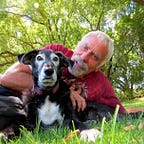I Am A Racist!
“I am a racist!” This is the phrase that needs to be uttered by every white American before the healing of 400 years of racism can be complete. The mere fact that I was born white in America makes me a racist. The fact that my formative years were lived in white America during the 1950s makes me a racist. The fact that I grew up surrounded by white people who openly and casually used the “N” word makes me a racist. The fact that I remained silent even after I knew the hatred in the people around me was wrong, makes me a racist. Racism is like alcoholism, you can never be an ex-racist. You can only become a recovered racist. Racism is so entrenched and systemic in our culture that it’s subtle aspects are like death from a thousand cuts.
I can never really know what it’s like to grow up black in America. As a white man I can only try to understand by listening and observing with an open mind. Being enslaved, sold as chattel is not something any white American can claim as part of their history. We can only hope that a careful inspection of our ancestry doesn’t turn up some Grand Wizard of the KKK. As a white American, simply saying I am not a racist is not enough, because it’s not true. As long as we continue to willingly reap the economic and cultural benefits of institutionalized racism, we are complicit.
I believe my personal transformation began when my best friend died at the age of ten. At Sandy’s funeral, the most feared black girl in the 4th grade, Mary, cried louder and longer than anyone in attendance. That endeared me to Mary while shining light on my own unconscious stereotyping. Earlier in the week I saw my mother practically in tears after she had volunteered to collect flower money for the funeral, on behalf of the 4th grade. She had never imagined that such poverty could have existed just blocks away from Collett Street, to quote Tracy Chapman, “over the tracks that separates whites from blacks.”
Sandy’s death made me ask all the questions one asks when confronted with the possibility of facing one’s own mortality. I quietly reached out to Grace Methodist Church where I sang soprano in the choir. The church was near my grammar school, Collett School, which had the second highest number of black students in the city. During my heightened sense of awareness brought on by grief, I accidentally stumbled into a meeting of the church elders where they were discussing how to keep “N…s” from joining the church. I told my parents I now longer wanted to go to Sunday School.
As a gay man I have a lifetime of experiences that give me a better understanding of the stories of people of color. I know first hand the terror that can exist when one is being beaten by a bigoted police officer yelling epithets as he strikes another blow to the back of the head. I know how it feels to plead innocence that falls upon bigoted deaf ears. I know the concept of entrapment. I know what it feels like to scream into a wilderness of distractions designed to drown out legitimate claims. I know the feeling of living in a world controlled by people different than myself, but also invested in keeping me invisible and powerless. I have felt the anguish of knowing that complete strangers simply hate me for who I am, without knowing who I really am.
All those people marching in the streets of America have empowered me. They have given me the courage to proclaim that by virtue of being born white in America, I am a racist. I stand with all my brothers and sisters of color in asking for the privileged class to admit their privilege, to stand aside for others who deserve to share the so called American Dream. It’s time for a sea change, a new paradigm. VOTE in November!
